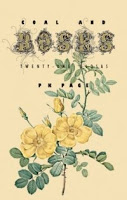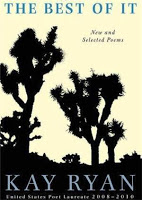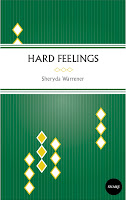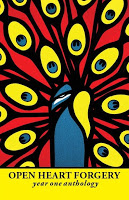Okay, okay I borrowed the title of this post today from a new book, but it was so catchy I couldn’t help myself, hoping it would make you curious enough—or incensed enough—to read about some great recent poetry writing.
B eautiful and Pointless: a guide to modern poetry is a new title from David Orr. Orr is the New York Times Book Review’s Poetry Critic, so while I bet he thinks a lot of poetry is beautiful, he doesn’t think it’s pointless, and he wants non-poetry readers to know why. April is of course poetry month and this attempt to appeal to non-poetry readers is an important part of this event each year. It’s an appeal that has worked on me I think (and one we’ve addressed in previous years here at the Reader). Each of the past few years I’ve made a conscious effort to include more poetry in my reading, and it’s a move I’m glad I’ve made.
eautiful and Pointless: a guide to modern poetry is a new title from David Orr. Orr is the New York Times Book Review’s Poetry Critic, so while I bet he thinks a lot of poetry is beautiful, he doesn’t think it’s pointless, and he wants non-poetry readers to know why. April is of course poetry month and this attempt to appeal to non-poetry readers is an important part of this event each year. It’s an appeal that has worked on me I think (and one we’ve addressed in previous years here at the Reader). Each of the past few years I’ve made a conscious effort to include more poetry in my reading, and it’s a move I’m glad I’ve made.
 I haven’t read Orr’s book yet, though it’s on my “to read” list since having heard about it in a Salon.com article. I liked Orr’s approach to the book: asked who he thinks the ideal audience for the book is, he explains that he hopes it will be read by people who are readers, but not necessarily poetry readers and that after reading it he “would like for a person to feel … not that they know everything about poetry or that they now have some instructions for reading poetry or even that they should read poetry — but just this: Should they decide to read poetry, they might do so with slightly less terror.”
I haven’t read Orr’s book yet, though it’s on my “to read” list since having heard about it in a Salon.com article. I liked Orr’s approach to the book: asked who he thinks the ideal audience for the book is, he explains that he hopes it will be read by people who are readers, but not necessarily poetry readers and that after reading it he “would like for a person to feel … not that they know everything about poetry or that they now have some instructions for reading poetry or even that they should read poetry — but just this: Should they decide to read poetry, they might do so with slightly less terror.”
We haven’t talked much about poetry this month at the Reader, but poetry is still on the radar. So I’ll end this post with a few poetry books that I’ve enjoyed (and one I’m looking forward to) this year.
 Coal and Roses: twenty-one glosas
Coal and Roses: twenty-one glosas
by P.K. Page.
The introduction to this collection tells us “the glosa form opens with a quatrain, borrowed from another poet, that is then followed by four ten-line stanzas terminating with the lines of the initial passage in consecutive order. The sixth and ninth lines rhyme with the borrowed tenth.” I love seeing what poets can do with forms. Often there is surprising depth one can fit into a defined structure. With this collection, I was tempted first to read the poems which borrowed from poets I already knew: E.E. Cummings, Theodore Roethke and Anna Akhmatova.
 The Best of It: new and selected poems
The Best of It: new and selected poems
by Kay Ryan.
Kay Ryan was United States Poet Laureate from 2008-10. This collection contains over 200 poems from the poet’s long career. They are the sort of poems that look stark on the page: short lines, lots of white space and are succinct but contain big ideas. This book just won this year’s Pulitzer Prize for Poetry.
Hard Feelings
by Sheryda Warrener.
 A first book from a Canadian poet and, full disclosure, someone I know. But often it is our friends that broaden our horizons in terms of reading and writing and other forms of expression. Each of the four sections of this slim volume has a distinct feel, but there is a consistent clarity in all the poems. Talking about her own writing, Warrener has said “I attempt to highlight the remarkable qualities of any ordinary moment in my poems… I have a preoccupation with what I would consider life’s extraordinary details”. Here’s an interview from Open Book Toronto that also includes one of the poems from the collection.
A first book from a Canadian poet and, full disclosure, someone I know. But often it is our friends that broaden our horizons in terms of reading and writing and other forms of expression. Each of the four sections of this slim volume has a distinct feel, but there is a consistent clarity in all the poems. Talking about her own writing, Warrener has said “I attempt to highlight the remarkable qualities of any ordinary moment in my poems… I have a preoccupation with what I would consider life’s extraordinary details”. Here’s an interview from Open Book Toronto that also includes one of the poems from the collection. Open Heart Forgery : year one anthology
Open Heart Forgery : year one anthology
edited by Donal Power.
Although I haven’t read this full collection yet, I have read several issues of the free monthly zine that this volume is collected from. Open Heart Forgery is “a grass-roots publication that aims to give voice to local Halifax writers and to build a community of writers and readers within the Halifax Regional Municipality”.
Source: http://www.thereader.ca/2011/04/beautiful-and-pointless-poetry-month.html


